|
The Later Years
In the early 1960s Villiers were taken over by Manganese Bronze Holdings
and became Norton Villiers. DMW purchased the remaining stock of Villiers
spares and some of the tooling to become the main source for Villiers spares
and reconditioning. DMW also took over the servicing of the 11E engines that
were used in invalid cars. This was very important to both Villiers and the
Ministry, who wanted to ensure that the existing engines would be looked
after. DMW also purchased the production rights to the 37A 250c.c. engine.
|
|
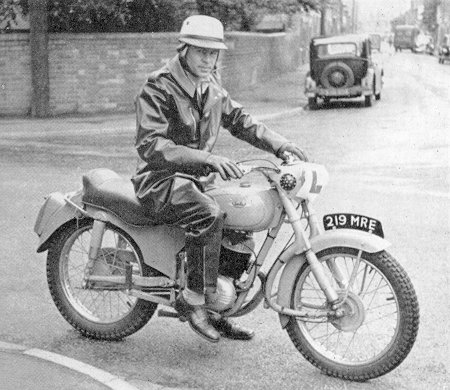
Ian Jones on his DMW. |
In 1956, Ian Jones, a 24 year old industrial chemist
from Melbourne, returned home after a 2 year stay in England. He
purchased a DMW motorcycle for the journey home and was taught to ride
by Harold Nock. He also spent 3 days at the Villiers Service School to
learn about the engine.
Exactly 4 weeks after buying the machine and
doing about 1,000 miles in England, he rode the machine home to
Australia.
His journey included travelling through Europe, Greece,
Yugoslavia, Turkey, Syria, Lebanon, Jordan, Iran, Iraq, Pakistan, India,
Malaya, Singapore, and then by boat to Darwin. He finished the journey
by travelling down the eastern coast of Australia to Melbourne. |
|
The Foyer at Valley Road.
Courtesy of
Jo Skidmore. |
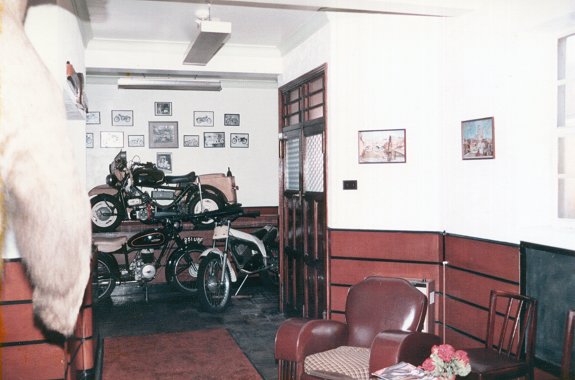 |
|
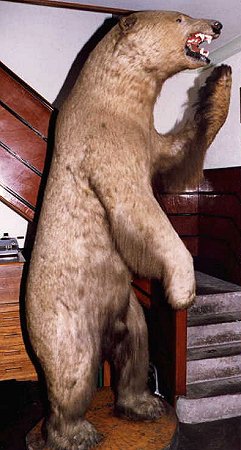
The stuffed polar bear that became a prominent feature in the works' foyer. It was purchased from Trentham Gardens by Harold Nock. A male and female were for sale and
he intended to buy the pair. When he arrived the female had already
been sold and so he ended up with just the male.
Courtesy of Jo
Skidmore. |
In 1975 Harold Nock sold the company to engineer, Graham
Beddall, who ran the Kingswinford Jig and Tool Co. Ltd., and Ivan
Dyke. Harold Nock was a wealthy enthusiast who ran the business as a
hobby, producing small numbers of expensive, high quality machines and
parts. When Graham and Ivan took the business over their main
priority was to make the business profitable. Ivan, an accountant by
trade, joined Metal Profiles as company accountant in 1965. In the late 1960s, Graham, Ivan and Tony
Hodges became company directors and managed the business, as Harold Nock
was nearing retirement. When Harold retired to the Isle of Man in 1971,
they continued to run the company and purchased it four years later.
They both realised that the future lay in capitalising on the company's
existing facilities. There was a tool room for manufacturing all of
their own jigs, tools and fixtures, for precision engineering
work, and so they concentrated on this side of the business,
which paid off.
When they purchased the company, it had seven employees and
this soon grew to 35. There was a wide product range including
brass door locks for Warrior and Saxon tanks, aluminium
flywheels for feeding British Telecom's fibre optic cable, angle
iron cutters, parts for fork lift trucks, lorries and conveyors,
and much more.
Although the motorcycle work continued, it
played a smaller but important role in the business. The company
continued to supply many Villiers spares from stock and also
manufactured batches of many parts including chaincases, crankcases,
gears, gearshafts and the Metal Profiles forks. |
The Valley Road works entrance.
Courtesy of
Jo Skidmore. |
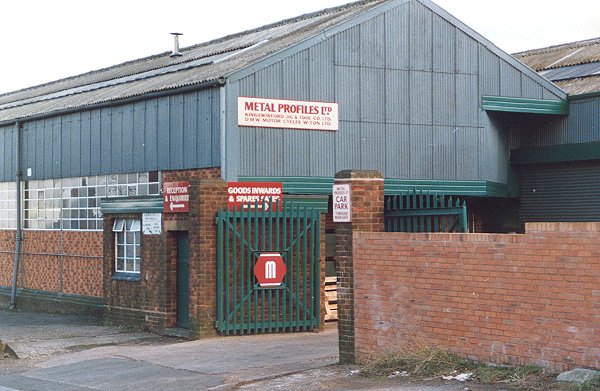 |
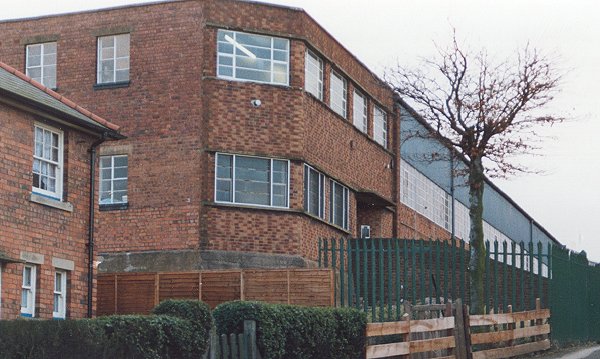 |
The Valley Road works offices.
Courtesy of
Jo Skidmore. |
|
The Valley Road works.
Courtesy of
Jo Skidmore. |
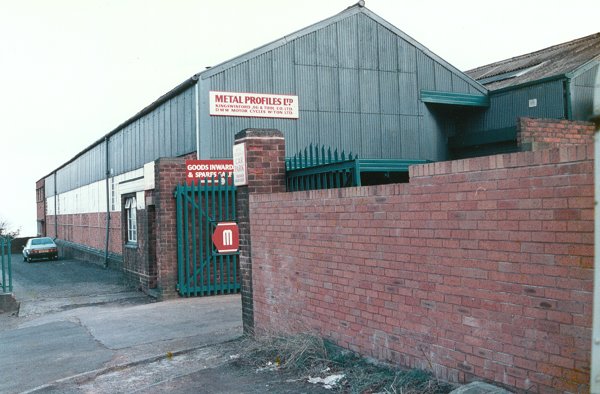 |
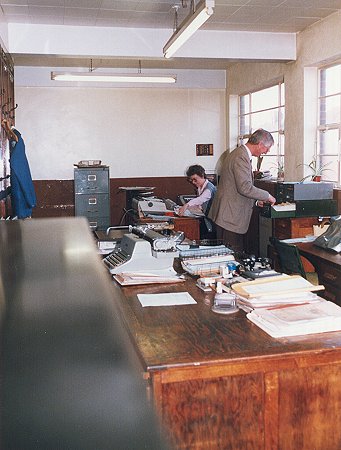
Part of Metal Profiles Office. The
gentleman in the picture is Gordon, the estimator.
Courtesy of Jo Skidmore. |
A reconditioning service
was also on offer for Villiers engines and Metal Profiles forks. Much of
this was carried out by Paul Foreman, who also ran the spares counter.
A lot of
the business was done by mail order with May Rodway in charge of the
stores. She was an acknowledged expert on Villiers engines and was
consulted by enthusiasts from all over the world, until her retirement
in 1989.
The company continued to build small numbers of racing
machines, and Mike Parkes, the works development rider was ACU Midland
Centre Group Trials Champion on a 250c.c. DMW in 1976 and 1977. This was
the first British bike in years to have won any major event in the
trials world.
The racing machines were built from modified Villiers
components and everything was made at Valley Road, including the frame,
forks, engine and gearbox.
Because of this, when Mike picked up his
first award he was greeted with an enthusiastic chorus of 'Rule
Britannia'! |
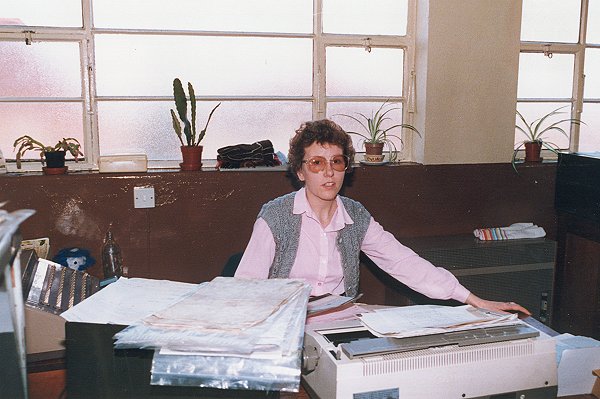
Metal Profiles secretary. We can't
find her name. If anyone recognises her, please contact the
webmaster.
Courtesy of Jo Skidmore. |
| DMW also produced a range of engines which were a
development of former Villiers designs. Engines were supplied to a
number of manufacturers including Cotton.
Motorcycle enthusiast, Ken Pinches of Worcester, purchased what is thought to be the last DMW
machine, built in 1978.
It is powered by DMW’s own version of the
Villiers Starmaker single, with a 4 speed gearbox. The cylinder head and
barrel are DMW pattern. The machine is fitted with Metal Profiles forks
and 7inch drum brakes.
Graham and Ivan retired in 1995 and sold Metal Profiles,
the forks and Villiers spares. They retained ownership of the 'DMW
Motorcycles Wolverhampton Ltd.' name until 2001, when it was finally
relinquished.
The company was the last motorcycle manufacturer in
the area. Its passing marked the end of an important era. In its
heyday DMW produced about 50 machines per week, and produced about 15,000
machines during its lifetime. |
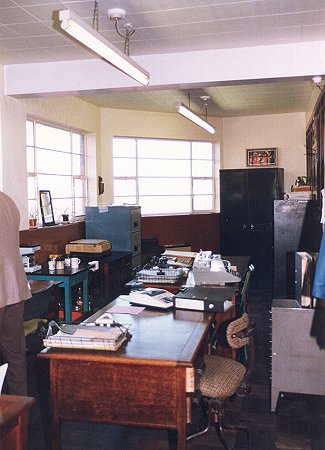
A final view of the office.
Courtesy of Jo Skidmore. |
|
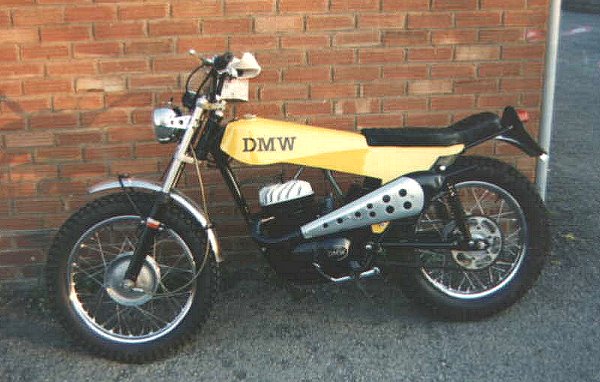
The last machine to leave the factory. It was purchased by Ken Pinches.
Courtesy of Jo Skidmore. |
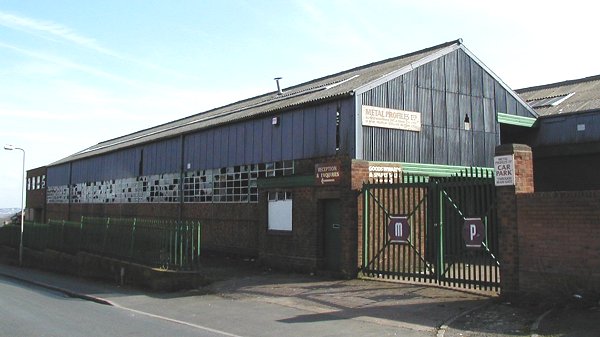
Valley Road works, awaiting demolition.
| Metal Profiles was sold to a Bilston engineering company,
but only lasted about two years before going into liquidation. The forks
part of the business was sold to Competition Classics of Cheshire. They used
the DMW name, brought the spares, and sold and made forks. The Valley Road
works was demolished in late June 2002, to make way for houses, but the
company will not be forgotten thanks to the many surviving machines that are
in the hands of enthusiasts, and will continue to appear at racing events and
rallies. |
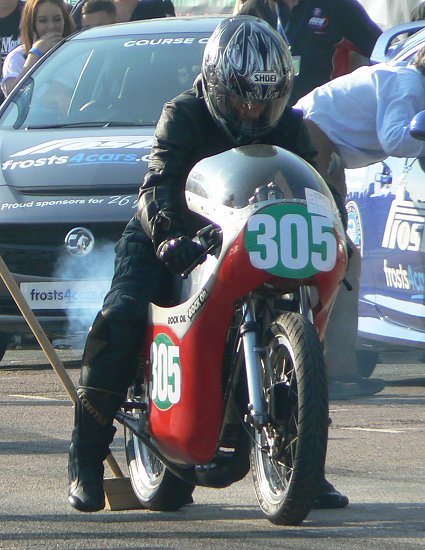 |
One of the company's machines,
a 'Hornet' from 1965 could be seen in action at the 2017
Brighton National Speed Trials.
The 246 cc. machine, ridden by
John Holt finished in 7th place in the Vintage & Classic
(up to 1972) Consistency Class. He achieved a speed of
89.1mph.
He is seen here at the start.
Courtesy of Brian Shaw. |
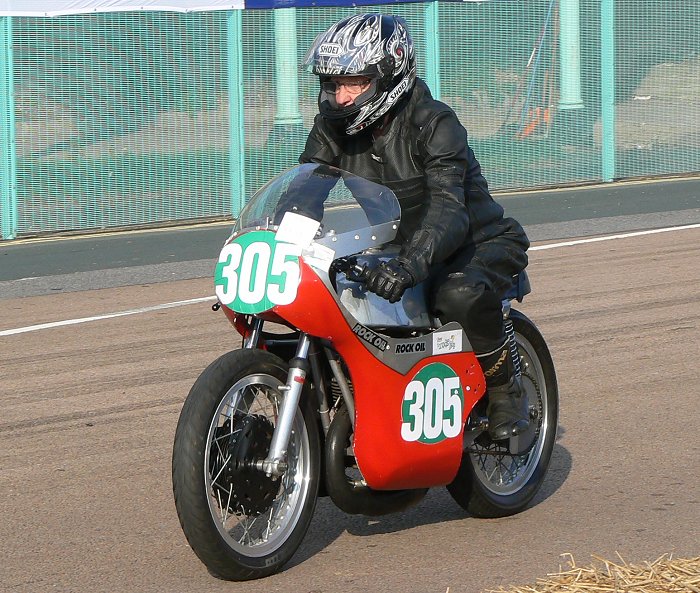
John Holt and his DMW 'Hornet' running
back at the 2017 Brighton National Speed Trials. Courtesy of
Brian Shaw. |
 |
|
 |
|
 |
Return to
More
Machines |
|
Return to
the beginning |
|
Proceed to
DMW
Catalogues |
|